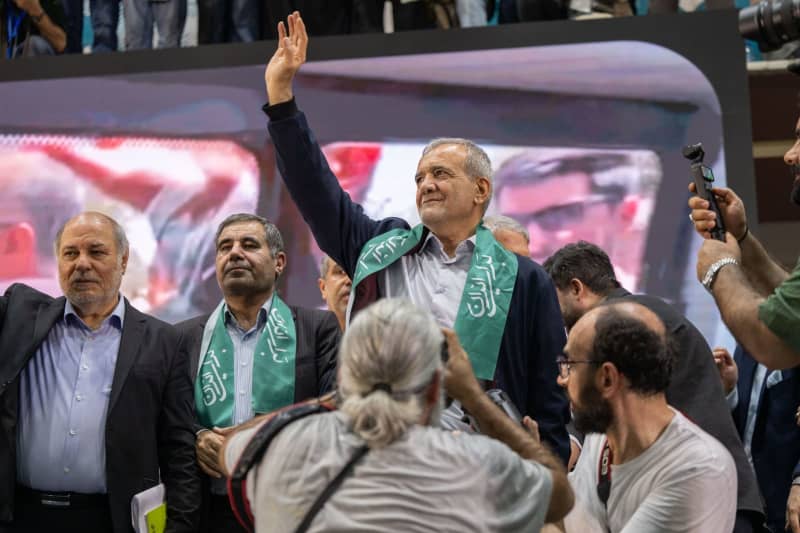Reformist candidate and heart surgeon Masoud Pezeshkian has won Iran’s presidential election after defeating his ultra-conservative rival Saeed Jalili in a second round.
Iran’s electoral authority reported Saturday that Pezeshkian, a former health minister, won 53.7% of the votes cast, compared with 44.3% for Jalili, a former top government nuclear negotiator.
State television showed images of supporters celebrating the 69-year-old Pezeshkian’s victory by honking their horns in the early hours of the morning.
“We will extend the hand of friendship to everyone,” Pezeshkian said in his first speech, stressing that he would work with his political opponents “for the progress of the country.”
Jalili did not want to comment on the election results yet.
Pezeshkian ran a modest campaign calling for renewed trust between the government and Iranians, many of whom have become disillusioned with politics after failed reform efforts, political repression and an economic crisis.
But given Iran’s complex political situation and powerful interest groups, it is unclear to what extent Pezeshkian can bring about meaningful change.
But his victory – and the low voter turnout – showed how dissatisfied many Iranians are with their leaders.
About 61 million people were eligible to vote for a successor to Chairman Ebrahim Raisiwho died in a helicopter crash in May.
Pezeshkian and Jalili faced off in the second round of Friday’s elections after neither candidate won an outright majority in the first round on June 28.
Polling stations were scheduled to close at 6 p.m. Friday. As expected, authorities let them stay open longer in many places, but turnout was still just 49.8 percent, the electoral authority said. In the first round last week, turnout was a record low of 40 percent.
Saudi leaders look forward to closer ties
Saudi Arabia’s leaders congratulated Pezeshkian and expressed interest in further developing ties with his country.
Last year, Saudi Arabia and its regional rival Iran, which backed both sides in the conflicts in Yemen and Syria, agreed on a China-brokered deal to restore ties after a seven-year rift.
According to the Saudi state news agency SPA, King Salman had said in a congratulatory telegram to Pezeshkian that he looked forward to the “continued development of relations” between the two countries and coordination to “enhance regional and international security and peace.”
According to the SPA, Saudi Crown Prince Mohammed bin Salman, the de facto leader of the oil-rich monarchy, sent similar congratulations.
Conservative reformer
Pezeshkian, a certified cardiac surgeon from northwestern Iran, served in the army during the Gulf War and worked for many years in the city of Tabriz.
In the early 1990s, he lost his wife and one of his sons in a car accident. He often appeared at his campaign rallies with his daughter and grandchild.
He was Minister of Health during the second term of former President Mohammad Khatami, from 2001 to 2005.
During the televised debates, Pezeshkian described himself as a conservative politician who believes reforms are necessary.
Despite his moderate rhetoric, he has still expressed his loyalty to Iran’s Supreme Leader Ayatollah Ali Khamenei and the powerful Islamic Revolutionary Guard Corps.
Like many politicians from the reformist camp, Pezeshkian advocated better relations with the West.
He also criticized Iran’s strict headscarf requirements for women and campaigned for middle-class votes, saying he opposes internet censorship.
However, critics say it will be difficult for him to implement these reforms because parliament has a hardliner majority.
Growing public frustration
Of the 80 candidates in total, the Guardian Council, a powerful Islamic supervisory body that vets candidates, had approved only six candidates for the election.
Two of the six later withdrew, leaving three conservatives and one more moderate candidate, Pezeshkian. Jalili is a loyal supporter of the leaders at the top of the Islamic Republic’s power system.
The president is only number two in Iran’s power structure, as Supreme Leader Khamenei serves as head of state and has the final say in all strategic matters. He is also the commander-in-chief of Iran’s armed forces.
The elections came amid a severe economic crisis, tensions with the West and regional powers in the Middle East, and public frustration over the maintenance of state authority, particularly among the younger population, is running high.
However, many Iranians, especially young people, have lost confidence that major political changes will take place in their own country.
Symbolic victory?
“Even among the regime’s supporters, there are still significant numbers who favor a more moderate approach and cautious reforms,” Tareq Sydiq, an Iran analyst at Germany’s University of Marburg, told dpa.
Peseshkian’s election victory is likely to be a symbolic success for Iran’s moderate and reformist forces, he said. “This will certainly be recognized at least within the system of power.”
But it is unclear to what extent Peseshkian can implement changes, after his criticism of the headscarf policy and the strict checks by the morality police. “It remains to be seen whether the various power blocs will be impressed by his ideas,” Sydiq said.
He said it is uncertain how many of the changes reformers seek can be implemented in practice, given that parliament is currently dominated by hardliners.







